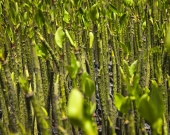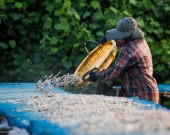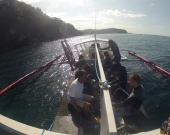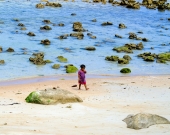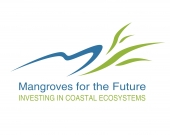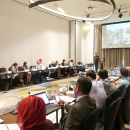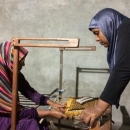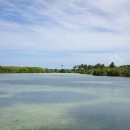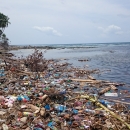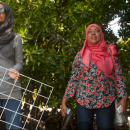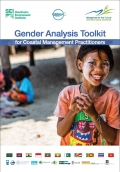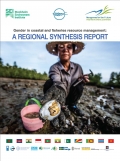The Maldives is particularly vulnerable to climate change as it consists primarily of low-lying coral atolls. MFF is assisting the Maldives to adopt a national Integrated Coastal Management approach that fully responds to and advances the Maldives National Adaptation Programme of Action on climate change.
MFF is supporting awareness-raising of climate change at island level and promotes activities such as climate adapted agricultural practices that minimize soil and water use. Ensuring a safe and healthy island environment is another MFF priority, particularly by improving waste management practices and by educating island residents about the importance of environmental protection. The MFF Programme was endorsed by the National Planning Council of the Government of Maldives in September 2011.
The Maldives is composed of a series of low lying islands, where any area of land mass constitutes a coastal area. The total exclusive economic zone (EEZ) of the Maldives is 959,100 sq km. Maldives holds a range of coastal ecosystems including coral reefs, seagrass beds, lagoons, beaches, and small areas of mangrove. Maldives depends entirely on the coastal and marine ecosystems as the asset base of the national economy.Tourism, the largest contributor to GDP, is based wholly on the health and attractiveness of Maldives’s coastal features.
The country’s second largest industry, fisheries, depends greatly on the productivity of healthy coastal and marine ecosystems. Some 29,577 people were displaced and 82 lost their lives. Of the inhabited islands, 53 were severely damaged, and another 14 islands had to be evacuated. The World Bank estimated the damage at USD 472 million.
Development activities have had significant impact on the coastal ecosystems in the Maldives. Some development activities, such as harbour dredging and land reclamation, permanently change the natural environment and substantially damage habitats while activities such as the improper disposal of solid waste and sewage have a slow cumulative impact on the environment. Beach erosion is a serious problem, with 97% of inhabited islands reporting beach erosion and the uncontrolled disposal of solid wastes, including medical waste, is a threat to coastal and marine ecosystems. The environmental impact of tourism and fisheries activities is often managed to a high standard. On the other hand, human settlements development, transportation and energy projects are undertaken without adequate environmental management and there are no set environmental standards for these sectors.
Climate change Considerations
Climate-related hazards, such as accelerated sea level rise, sea surface temperature rise, changes in monsoon pattern, are some of the key challenges facing Maldives. The Government of Maldives has acquired global recognition and leadership among small island nations in planning for climate change. It has already set the target of becoming carbon-neutral in a decade. Similarly, coastal zone management is now envisaged as a part of national policy to support and strengthen adaptation to impacts of climate change. One of the four objectives of the National Adaptation Programme of Action (NAPA) is to reduce the degree of adverse effects of climate change. The Detailed Island Risk Assessment in Maldives: Natural Hazard and Physical Vulnerability Assessment Report developed by UNDP Maldives (2008) identifies a number of climate-related hazards that need to be tackled. It is nationally recognised that delays in the immediate implementation of the initial measures required for adaptation to climate change may lead to more serious economic consequences. The Maldives MFF National Strategy and Action Plan (NSAP) reflects many of these considerations and climate change related actions are mainstreamed in the prioritised strategic actions.
MFF’s priorities in Maldives
The MFF Programme will give a special focus to strengthening of district and local level ecosystem management and socio-economic development. The priority areas from 2012 - 2013 are:
1. Support coastal livelihoods initiatives that are both sustainable and help to maintain natural ecosystems
2. Improve the resilience of coastal communities through coastal ecosystem management
3. Increase awareness of the economic value of coastal ecosystems and use this to prioritize, promote and support coastal conservation and development actions
4. Use of inland water bodies as reservoirs or recharge source of ground water
5. Facilitate the co-ordination of NGO and public private partnerships with government programmes and actions
6. Address key resource use problems, constraints and conflicts in general, and those related to mangroves in particular
7. Facilitate a process of building knowledge, strengthening empowerment, and enhancing governance especially at community- and island-levels
8. Facilitate the inclusion of new emerging issues and new approaches into Maldives coastal management
9. Facilitate cooperation between Maldives and the wider international community through participation and dissemination of information
10. Improving communication, awareness and education
12. Developing standard valuation tools that can be applied in the Maldives context
13. Improving governance especially activities on the role of media and civil society in coastal ecosystem management
MFF’s programme of work in Maldives
MFF’s work in Maldives is overseen by a National Coordination Body (NCB Maldives), which is composed of members from a range of governmental departments and inter-governmental organizations. A National Strategy and Action Plan (NSAP) guides the work of the NCB. The NSAP is developed through wide consultations between the relevant government and non-governmental institutions for a period of 2 years, ensuring that changes in the policies are captured when the NSAP is revised. It provides an opportunity for implementation of ICM for island ecosystems to test and develop models in parallel with the national ICM programme. Priority geographic areas have not been selected for the Maldives. MFF activities in the Maldives has been in a few atolls comprising Baa Atoll, Noonu Atoll and Haa Dhaal / Haa Alif Atolls. In this light, and as the institutional capacity of the existing NGOs in the middle parts of the country is low, the MFF Programme has planned to carry out an outreach activity to these atolls. The objective of the activity is to increase awareness on the opportunities available under the MFF Programme and give an introduction to project cyclem management.
The MFF Programme ensures the following conditiions on the programmes partnerships with the NGOs:
- Geographic equality to ensure that there is at least one ICZM model in each province
- Encourages co-management among key stakeholders
- Inhabited islands with medium population size
Alignment of ongoing in-country initiatives and priorities
The Maldives MFF NSAP supports the development vision of the Government of Maldives and associated policies as they relate to the sustainable use and management of coastal ecosystems and adaptation to climate change in the context of integrated coastal management (ICM). The NSAP provides an opportunity for implementation of ICM for selected ecosystems to test and develop models in parallel with the development of a national ICM programme. The first NSAP was developed to contribute and complement existing urgencies for ICZM. The NSAP has no wbeen revised to align to the current Strategic Action Plan (SAP 2009-2013) of the Government of Maldives, and includes the priority areas identified by the relevant government authorities. The NSAP is a dynamic document that aligns national priorities and MFF 15 programmes of work. Boradly, the Maldives NSAP falls into ensuring environmental sustainability, increasing economic opportunities, and to enable private and civil society participation.
 Maldives
Maldives 
